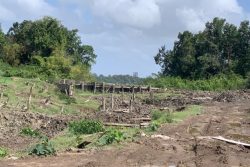Barbados Ambassador to CARICOM David Comissiong has welcomed the recent decision by Heads of Government to urgently establish a small expert group to inquire into the situation on the ground in Haiti and to report on its findings, saying it would enable the regional body to help craft a solution to the ongoing crisis there.
In a statement, Comissiong noted that at the recently concluded Heads of Government Conference, Prime Ministers and Presidents expressed their deep concern over the deteriorating political situation and the deepening public anxiety over citizen security in Haiti.
In their concluding statement, they also underlined the importance of respect for the rule of law and constitutional processes as laid out in the CARICOM Charter of Civil Society, and the primary responsibility of the government to this end. Further, they called on the political actors to engage in dialogue to reach consensus on the way forward and establish an enabling environment for the conduct, as quickly as possible, of the elections to renew the lapsed legislative and local government institutions, while adding that they look forward to the conduct of free and fair presidential elections, in accordance with the Constitution of Haiti.
CARICOM Heads of Government also mandated Ambassador Colin Granderson of the CARICOM Secretariat to urgently establish a small expert group to inquire into the situation on the ground in Haiti and to give a report on its findings to the Heads of Government.
Comissiong called it very encouraging to see that the CARICOM Heads of Government have prominently referenced the Charter in their statement on Haiti.
He noted that numerous principles expressed in the Charter are directly relevant to the crisis situation that currently exists in Haiti, particularly those that relate to adherence to democratic political practices and rights; the right of the people to engage in public meetings and demonstrations; maintenance of the principles and practices of good governance; respect for the independence and impartiality of the judiciary; and adherence to the right of the people and the various social partners to be consulted and to participate in national decision making.
“In light of the foregoing, it seems clear that an objective and impartial application of the CARICOM Charter of Civil Society to the situation in Haiti would be extremely useful in providing a way out of the untenable impasse that currently exists and in helping to resolve the crisis situation, and no doubt, Ambassador Granderson’s expert fact finding group will bear this in mind,” he added.
Comissiong noted that CARICOM’s “deep concern” about the situation in Haiti comes against the background of the dissolution of Haiti’s Parliament last January, owing to which there has been no parliamentary oversight in the territory of some 11 million, while the president continues to issue decrees, last month’s arrest of Supreme Court Justice Yvickel Dabresil and Police Inspector General Marie Louise Gauthier; the Presidential decree that removed three Judges from the said court, and the installing of three replacement Judges; the police seizure of control of the court and the Ecole de la Magistrature and the police use of live ammunition against protestors.





